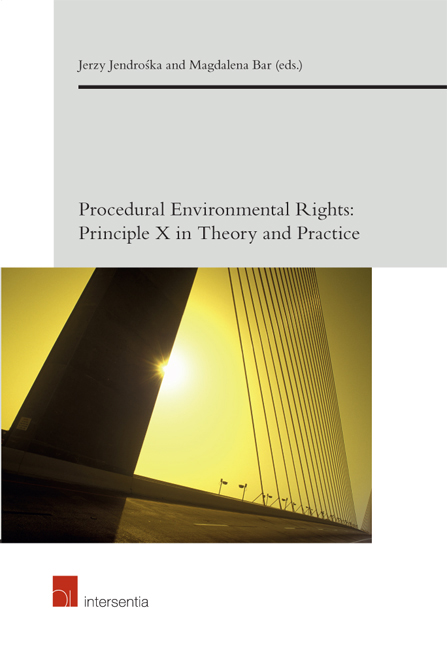Book contents
- Frontmatter
- Contents
- Introduction Procedural Environmental Rights in Theory and Practice
- Procedural Environmental Rights: Status and Developments
- Procedural Environmental Rights in Practice
- Public Participation
- Access to Justice
- Procedural Environmental Rights and Nature Protection
- Procedural Environmental Rights and EIA
- Public Participation and EIA in the Multi-Stage Decision-Making Process: The Czech example
- Use of the Bounding Conditions Envelope Concept in the Polish System of Environmental Impact Assessments
- Special Provisions on the Issuance of Environmental Decisions in Sectoral Legislation in Poland
- Procedural Environmental Rights and Climate Change
Use of the Bounding Conditions Envelope Concept in the Polish System of Environmental Impact Assessments
from Procedural Environmental Rights and EIA
Published online by Cambridge University Press: 12 October 2018
- Frontmatter
- Contents
- Introduction Procedural Environmental Rights in Theory and Practice
- Procedural Environmental Rights: Status and Developments
- Procedural Environmental Rights in Practice
- Public Participation
- Access to Justice
- Procedural Environmental Rights and Nature Protection
- Procedural Environmental Rights and EIA
- Public Participation and EIA in the Multi-Stage Decision-Making Process: The Czech example
- Use of the Bounding Conditions Envelope Concept in the Polish System of Environmental Impact Assessments
- Special Provisions on the Issuance of Environmental Decisions in Sectoral Legislation in Poland
- Procedural Environmental Rights and Climate Change
Summary
ABSTRACT
The subject of the publication is an analysis of legal and procedural conditions for the use of the Bounding Conditions Envelope (“BCE”) concept in the system of environmental impact assessments (“EIA”) of projects in Poland. The publication presents key aspects constituting the essence of the impact assessment procedure (screening, scoping, variant analysis, public participation, optimal content of decision on environmental conditions (“environmental decision”) and relationship between the primary EIA and reassessment at the construction permit stage) in the context of applicability of the BCE. Although this topic has not yet been assessed in terms of adaptation to the Polish legal system, the BCE has already been applied in an environmental decision for the first offshore wind farm project and to a scoping decision for the first Polish nuclear power plant project; both are briefly described. The article is divided into two main sections. The first one presents the results of an analysis of using the BCE under the Polish legal system and its influence on public participation. The second part presents methodological principles and practical application of the BCE in EIA of projects.
KEYWORDS
bounding conditions envelope; EIA; Environmental Impact Assessment; offshore wind energy; Poland; project
INTRODUCTION
The subject of the publication is an analysis of legal and procedural conditions for the use of the Bounding Conditions Envelope (“BCE”) concept in the system of environmental impact assessments (“EIA”) of projects in Poland. The BCE allows the investor to perform EIA using maximal project parameters without having to specify e.g. specific technology or the final number of units. This topic has not yet been assessed in terms of adaptation to the Polish legal system.
The article is divided into two main sections. The first one presents the results of an analysis of using the BCE under the Polish legal system and its influence on public participation. The second part presents methodological principles and practical application of the BCE in EIA of projects.
The aim of the article is to analyse the effectiveness of procedural modalities determining the application of the BCE in the Polish system of individual EIAs.
- Type
- Chapter
- Information
- Procedural Environmental RightsPrinciple X in Theory and Practice, pp. 409 - 424Publisher: IntersentiaPrint publication year: 2018



